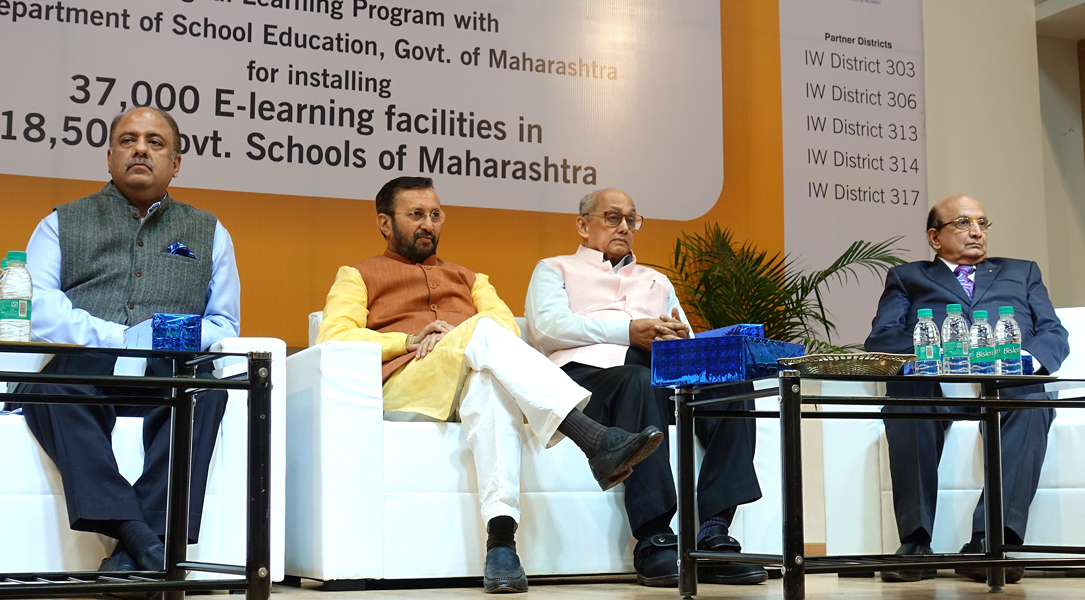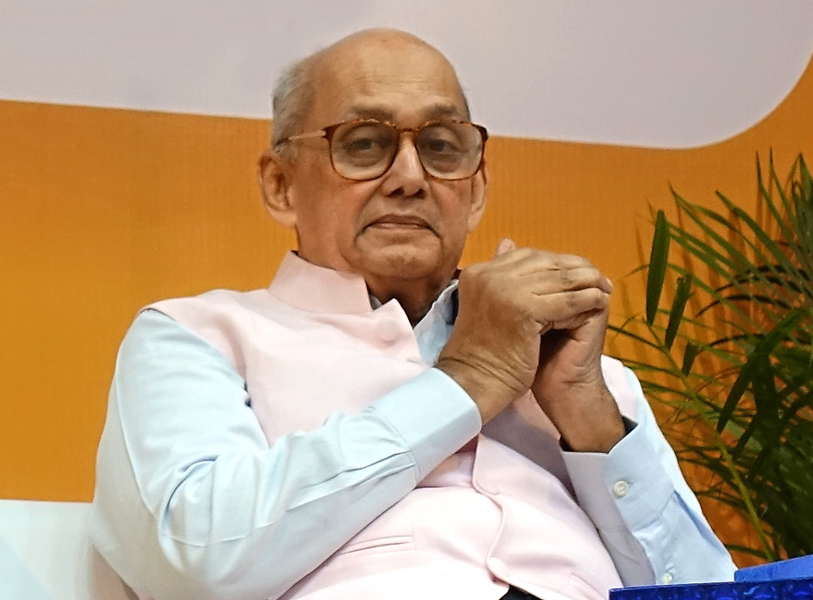From blackboard to digital board
Just as our government has reduced the prices of LED bulbs, similarly we will lower the price of digital boards and ensure that every school in India has at least one digital board,” said Union HRD Minister Prakash Javadekar, launching Rotary’s e-Siksha Mission at an event in Pune organised by the Rotary Indian Literacy Mission (RILM).

Clarifying at the outset that education cannot be the sole responsibility of the government and that total and quality education across India will happen only when the citizens participate, he welcomed the e-learning initiative of RILM headed by PRID Shekhar Mehta. Many people might not be aware that in Maharashtra, it was the primary teachers posted in remote, rural areas, who initiated the e-learning revolution. “Like many other good things in our country, even this digital revolution happened without government participation. A project becomes successful only when the community participates in it,” he said.
Javadekar said that in the 1960s, the popular slogan was ‘Operation Blackboard’. “But keeping in mind the need of modern times, “we want to provide a ‘digital board’ in each classroom.”
Rotary’s credibility
The Minister recalled that when a couple of years ago, his close friend PDG Pramod Jejuriker “came to me and talked about Rotary wanting to take up e-learning, I thought many people come to us and talk about big schemes; then nothing actually happens. But because it was Rotary, there was some credibility. And the government needs partners for doing everything, so what better partner than Rotary.” Hence his ministry signed an MoU to introduce e-learning in 18,000 schools in Maharashtra in partnership with Rotary, at the South Asia Literacy Summit in Chennai last year.
Education is not the sole responsibility of the government; we need partners for doing everything, and what better partner than Rotary?
– HRD Minister Prakash Javadekar
Addressing the meet, PRID Mehta said this was a “historic moment for Rotary as the impact of this massive programme is going to touch over 40 lakh children in India. And the value of the programme is over Rs 75 crore. Have you ever seen a programme in Rotary worth Rs 75 crore in India, polio apart?”
He assured the HRD Minister that this was only a beginning. “Apart from the 18,000 schools with the Maharashtra government, we have signed an MoU last month with the Madhya Pradesh government for 30,000 schools, the Punjab government for 20,000 schools and the Haryana CM has said let’s start with 2,000 schools and we will take it forward.”
Ultimately, the goal was to reach e-learning to every school in India, “but the momentum came only after we signed the MoU with Maharashtra. Combined, the value of this programme is Rs 150 crore. Times have changed in Rotary, we now have to think big, bold and bigger. Through this programme we will be reaching one lakh schools, and if we put the average strength of a school at 200 children, over 2.5 crore children will be impacted by this programme.”
If a school provides budget education to children in a slum, why should it matter if its playground isn’t big enough? Let parents decide what they value.
– PRIP Kalyan Banerjee
Mehta thanked the Maharashtra Education Secretary Nanda Kumar, who was present, “for the speed at which you do things”, and the Inner Wheel for partnering with Rotary in a big way to ensure success of the TEACH project.
Training 10,000 teachers
He also thanked RC Pune North for agreeing to give 10,000 tablets to 10,000 schools. Also, the ICEDC headed by Racquel Shroff had agreed to train 10,000 teachers. The curriculum has been approved by the Secondary Education Board. “It will be totally funded by Rotary, all that Nanda Kumar has to do is give us the names of the 10,000 teachers. We are ready to do everything to fulfil Past RI President Kalyan Banerjee’s dream of a totally literate India, but please make us the Government’s preferred partner on literacy.”

Apart from adult literacy and building libraries, the RILM was working on skill development too, and only last month PRIP Banerjee had signed an MoU with Cherie Blair of the Loomba Foundation in London under which 30,000 widows will be skilled for employment.
Addressing the meet, Banerjee said Rotary clubs in India have been committed to join hands and support the GoI in making India literate as early as possible. “Helping India go digital is a critically important step in the process and Maharashtra is well ahead of many other States in the country in this.”
Thanks to the evolution of digital technology in India, learning concepts had changed in schools. “The traditional chalk and talk method has paved the way for more interactive teaching methods as schools are increasingly adopting digital solutions to keep themselves abreast with technological changes.” With the current generation of students being well-versed with laptops, i-pads and smartphones, these innovative teaching methods guarantee more participation from students, he said.
It’s plain on the page and proved on the ground that funding girls’ education isn’t charity but investment, and the returns are transformational.
– PRIP Kalyan Banerjee
Today, most States in India were deep into digital education with thousands of schools, adopting it, and teachers were also being made digitally conversant. “We in Rotary believe that the first and most important aspect of schooling is good teachers; this is our most pressing need,” he said emphatically.
Maharashtra Education Secretary Nanda Kumar said a big revolution was sweeping across the State vis-à-vis digital literacy. “We have 66,000 government schools and of these, at least one classroom in 63,458 schools has become digital.” Also, from the 3 lakh teachers that the State had, “about 1.6 lakh teachers, many of whom are seated here, have declared themselves tech-savvy. This is not a government but a people’s project, and the ₹350 crore spent on these measures have come from both corporate and community social responsibility. And all this has happened, thanks to Rotary’s leadership.”
Through the digital learning programme, we will be reaching one lakh schools, and over 2.5 crore children will be impacted.
– PRID Shekhar Mehta
PRID Ashok Mahajan said a paradigm shift had taken place in teaching methodology and new technology was making learning much more effective and interesting. Surveys had found that school enrolment and attendance in Maharashtra had gone up following the introduction of e-learning. Attendance had improved by 15 per cent proving that digital learning was soon replacing the noon meal scheme as an incentive to attend schools by making education enjoyable.
DGs Abhay Gadgil (D 3131), Prafull Sharma (3141) and Vyankatesh Channa (3132) participated in the programme.
Pictures by Rasheeda Bhagat
Banerjee speak on girls’ education
Addressing the launch of the e-Siksha event in Pune, Past RI President Kalyan Banerjee made a passionate plea for educating the girl child and said the time had come to move beyond just the expression of “righteous indignation”.
Reiterating that he was speaking for girl’s education in entire South Asia, he said only education offers them “a fair shot, a path out of poverty.” Denying them education means that “women can work the land but can’t bank it.” This is why poverty is female-centred, and world leaders need to act to ensure that universal access to education by 2030, the target set in the Sustainable Development Goals, becomes a reality for girls too.
Apart from “ righteous anger at the injustice of all this, there is a need for outrage at the violence — physical emotional and legal — that perpetuates such injustice against girls. But there is also room for hope. Because the research is clear — it’s plain on the page and proved on the ground — that funding girls’ education isn’t charity but investment, and the returns are transformational.”
Give girls just one additional year of schooling and their wages go up by 12 per cent. “Give them as much schooling as boys, and things really start changing. Closing the gender gap in education could generate $112 billion to $152 billion a year for developing countries in South Asia. When you invest in girls and women, they rise and lift their families, communities, economies and countries. They rise — and they lead.”
He added that in these countries, there were 130 million girls “counting on women and men to get our collective act together, push for better policies and request politicians to do more and fund more of what works. Minister (Javadekar) Sir, let India show the way.”
State of flux
Banerjee said education in India was “in a state of flux. The government devotes vast amounts of money to it, but outcomes are not everywhere as hoped for or desired.” A recent Annual Status of Education Report (ASER), described by the government itself as “somewhat depressing,” showed that 52 per cent of students in Class V were unable to read a Class II textbook. And 58 per cent of Class VIII students could not do simple division, and teacher absenteeism was rampant. Also, compared to budget private schools, government teachers got much higher wages and were “more or less tenured. They have no reason to aim for excellence or try and provide quality education. How does one make them accountable, and make sure that our money is better spent? One answer is school vouchers. It’s a system gaining popularity in the US. Can it work here, I wonder.”
Under a voucher system, the government, instead of giving money to government schools, gives vouchers to parents, who then choose the best school for their children, and submit the voucher there. That school then gives the voucher to the government and gets the money to pay the teachers.
This changes the incentives for government school teachers. “They have to perform now, and deliver quality education, or parents will take their kids elsewhere. Competition brings accountability. This also empowers parents with choice; they can decide what is best for their children. In a nutshell, the State, instead of funding schools, as is done now, funds schooling,” said Banerjee.
He added that he had always supported putting up smaller, volunteer-run private schools in communities. “For 70 years, we have had regulations in places that disallow or disincentivise private schools, especially for the poor. If a school provides budget education to children in a slum, why should it matter if its playground isn’t big enough? Let parents decide what they value.”
Organisations such as the Centre for Civil Society had documented how thousands of poor parents in slums and villages across India prefer to send their kids to a budget private school rather than a free government school. “I believe that in a marketplace, the profit motive is the best incentive. After all, you can only make a profit by delivering value to others. When I was growing up, in the 1950s and ’60s, telecom, airlines and education were all government monopolies, and delivered, as we all know, poor quality service. Today, two of the airlines and telecom, allow private players to compete freely, and because of competition and the profit motive, we, the people, are better off.” But this hadn’t been done for education, “which is so important for our nation’s growth,” Banerjee added.

